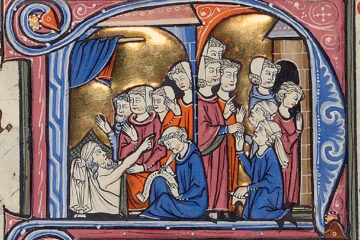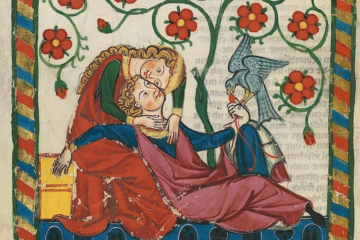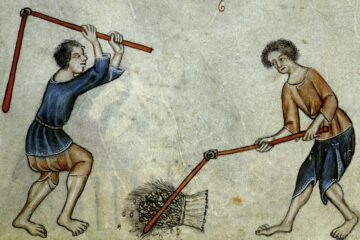A fire can consume an entire forest. Hundreds of years of growth lost in a single night, and the thing that started it is so small and insignificant. The spark which started this fire was the passing of Torrino I. The Late Emperor was a kind, strong, and just ruler. For forty years he reigned, and his realm knew only peace. Who would have guessed that the war which followed his death would last longer? A people ravaged by war know only war. This is why the war lasted so long. Pride is a deadly thing, especially when it is wielded by Kings.
After the death of his father, Emperor Philip declared himself as Holy Roman Emperor in order to challenge the Germans and the Papal authority in Rome. Making an enemy of the Church would prove detrimental to his efforts later on in the war, seeing as the Empire could have benefited from an aligned Divine Order within its borders, if not that, then at least a neutral one. Instead during the fifty years of war Frankish lands were often the target of Divine raids and many settlements were put to the torch, never to rise again.
Philip “the Young” trusted in his father’s final attempts to enlarge the Imperial Army, which was the source of the Empire’s power. A standing army, available, and well-trained was something feared throughout the world. The Frankish realms of Chatersberg, Aqvintia, Donofall, Vener, Maine, and Dover as well as other Imperial allies like Denmark and Sicily joined the war on the side of the Sirius Empire. The Roman Kaiser called the entirety of the Roman Empire to war against us. So many years after Charlemagne, and yet the Franks are around and vying for power against both Rome and Germania.
The first year of the war was uneventful, as all the powers had yet to experience the state of Total War. All they had ever known were minor skirmishes, short sieges, or epic battles.
Once Philip took charge of his army, however, things changed. The Germans faced, for the first time in a few centuries, a fighting force as powerful as the ancient Legions of Rome. With the death of Master Harry Gulcher and the sacking of Rosewood, much of the history is lost to us. Nonetheless, we have managed to recover German texts which speak of the tides of war.
One of the most important battles of the war was in 1133. The Battle of Buhl saw the full force of the Imperial Army with Emperor Philip at its head, alongside King Thomas and King Albert engage a coalition army of Divine, Germanic, and Papal Knights. It is said that the battle saw as many as 20.000 men in combat. This battle was a turning point in more than one way. Firstly, it upset the power balance of Europe entirely because both Emperors had died leading their respective armies. But besides this, the battle pushed for the modernization of cavalry and armor. Now, nobles were investing large sums of gold and silver into smiths who could produce effective sets of armor capable of protecting both a rider and his horse. Heavy cavalry seems to start to make its appearance after Buhl in nearly every large-scale battle of the war. Especially the Battle of Rosewood.
After the deaths of the two Emperors, both sides called for a temporary truce while they settled their own inside disputes. The Holy Roman Empire called for a diet to decide who was to inherit the Imperial Crown. While they were debating if continuing the Bohemian Dynasty was wise in this time of war, Pope Clement II passed away on the 21st of September 1133. This created discord within the Papal States regarding the election of a new Pope. While the majority of Cardinals agreed to choose a Frankish Pope, a Cardinal by the name of Baudoin, the Holy Roman Diet did not approve of the choice and pushed for another Germanic Pope. Two Popes were elected in 1134, neither of them present in Rome. Pope Alexander II (formerly Baudoin of the Sirius Empire) and Pope Clement III (formerly Stephen of Bavaria) were locked in a Papal War for power which tore the Papal States apart. Their status as the dominant force in Italia had been forgotten as they were split into a civil war. Adding to that, the fact that the Kaiser took most of his levies from Northern Italy caused significant unrest in the region, which sparked multiple rebellions against the Imperial Diet.
With the Holy Roman Empire and Papal States in disarray, one would think that the Sirius Empire would have more luck. This was not the case. When news of the Emperor’s death reached the court, the seeds of rebellion began to sprout. Namely, internal conflicts regarding the Winter Household of Rosewood and local conflicts. Now with the Imperial Army in shambles, lower lords decided it would be the ideal time to settle old scores and repay blood with blood. The Monarchy remained in power and legitimate. Torrino II ascended to the throne and was crowned as the Emperor of the Holy Roman Empire, and of Rome by Pope Alexander II. Beautiful how history rhymes like poetry. In an even more astounding twist of events, Torrino II would be crowned as King of all Frankia in 1133 once his ally Gerald “the Great” died in battle. Since his only heir was Torrino II’s mother, her titles passed onto him, making him Emperor of Aqvintia. Instead, Torrino II merged all his titles and formed the Second Carolingian Empire.
Upon his declaration, a fifth of the Imperial Army revolted and took control of southern Frankia. Torrino II “the Great” marched his armies south and crushed the rebellion by 1136. His invasion was swift and decisive, leaving little room for his men to loot or pillage. As such, he was adored by the Frankish people who for the first time in over two centuries found a shared sense of camaraderie. Torrino II knew the importance of morale and unity during war. He made sure that a new design was made of the Sirius Flag. His new Frankish Realm adopted the ancient fleur-de-lis and Charlemagne’s sun as its symbol. He promoted his rivals to positions of power within the Imperial Army, hoping it would quell their ambition until the war was over when he could finally deal with the strife in his realm. This would prove to be a critical mistake in the Second Imperial Revolt. Despite Torrino II’s many internal reforms and advancements in military technology, he was too focused on warfare and expanding the already too large Imperial Army. Against the warnings of the late Lord Argonon, Torrino’s grandson had empowered the Army and given it to regional lords instead of merited officers who served alongside their men. The army at this point was overextended, too expensive to maintain, prone to insubordination, and far from shy when it came to open rebellion by nobles in high-ranking positions.
In 1138, Torrino II had amassed a breathtaking army of near 12.000 men to combat the Holy Roman Empire, and their new Kaiser, Gunther II von Eppenstein, Prince-Elector of Carinthia. The German sources claim this to be their most desperate moment. A new Kaiser, a disorganized army, the Frankish invasion, and no Papal Authority in Rome. Now legends claim that in their hour of need an angel was sent to assist the German armies. Maria von Lohr donned her dead husband’s armor and rode into battle on his steed carrying the banner of Bavaria. This invigorated the men during the battle of Lohr who subsequently beat an Imperial detachment. So great was her feat that the King of Bavaria sponsored her and allowed her an army of her own to lead into battle against the Franks.
There are few texts that cover the period between 1140 and 1156, mostly due to the fact that Torrino II had realized that having a single, unified army wasn’t going to defeat the countless German armies which threatened his realm and often raided his own demesne. He, therefore, split the Imperial Army into multiple fragments and sent them to harass the German lands. For years, this was the state of things. German armies raiding Frankish lands and Frankish knights burning German villages. That is until 1156.
Come 1156, trouble was brewing for the Second Carolingian Empire. The Legions exhausted and underpaid decided to stage a massive revolt known as the “Second Imperial Rebellion“ in which the Kingdom of Deston was occupied by one-third of the Imperial Army. Torrino II barely managed to take back his territory and then learned of a large invasion force. A unified German Army lead by their Kaiser. Torrino II thought it wise to pick out a well-known field where the battle could take place, and he decided to gamble on Rosewood’s safety and chose the battleground to be only half a day’s ride from Rosewood.
In 1157 the German Army arrived and faced off against the Franks. The war had been waging for thirty years now and this one battle had the ability to end it all. Come early April, the Germans arrived and engaged the Frankish forces. Sources argue about the number of men involved, anything between ten and twenty thousand. Miraculously, more than one-third of the forces were mounted, heavy cavalry. The Battle of Rosewood lasted for an entire day and saw the death of near 6.000 men. It proved the efficacy of modern cavalry and pushed weapon-makers to produce modern pikes and halberds once the century turned. The battle turned in the Germans’ favor when the Emperor was downed by a stray crossbow bolt. He was taken back to the city and the army was left without its commander. The Imperial Army was shattered and broken. Some fled to Rosewood, others to the farthest reaches of the Empire, and seceded, forming their own counties in the midst of war. This would be known as the “Third Imperial Rebellion.“
By May, Rosewood had been put to siege. Thousands of men surrounded her walls and dozens of siege engines were being constructed. It was obvious that the Germans expected us to break, but the will of Rosewood is too strong. In what Pope Alexander III called a miracle, the coldest winter swept through the Empire and hit Rosewood hard. The Germans had no choice but to retreat in January of 1158. Torrino II died earlier last year, near Christmas due to complications regarding his wounds from a few months prior.
Since he had no heirs, the Crown passed onto his brother, Charles “the Bold.“ He attempted to raise an army once the winter lifted, but his numbers were too small to be a match for the Germans. So instead, Charles did the only thing he could. He ordered his men to seize the grain and stock of all of Rosewood’s surrounding settlements and ordered Rosewood’s granaries to be filled completely with reserves. Charles wanted to end the war by forcing the Germans to suffer through countless sieges and lose men through attrition. In 1159 when the Germans returned, Charles retreated into the City and forced them to besiege them. If they broke the siege, he would send small raiding parties to harass the German Knights. In the end, the Germans would try to breach Rosewood’s walls three more times. Their fourth and final attempt being in 1167.
The Siege of Rosewood began in March of 1167 and lasted until August of 1168. Two factors lead to the end of the final siege. Firstly, the City’s rations had been completely depleted. The realm was in open rebellion against the Crown and the Clergy began siding not with Alexander II, but with Clement III. And finally, a final assault by the Germans, invigorated by the presence of their new Kaiser, Wilhelm II von Eppenstein, and the arrival of Maria von Lohr, now a hardened commander and the only woman to do so in the German army. The Kaiser represented the men’s duty to country, while Maria was seen as an angelic figure, a symbol of the prevailing of the Germans over their enemies. On the 15th of August 1168, Rosewood’s walls were breached and her Eastern part was overrun by the enemy. Most of the army managed to cross the bridges, destroying all of them, but the largest one. It was then that Charles “the Bold” gave his famous speech: “Good men of France,” before ordering a final desperate defense of Rosewood.
Emperor Charles “the Bold” was slain in battle that day and the city was looted for three days. The Imperial Family managed to flee Rosewood and went to the City of Alparis where they remained until the end of the war.
With the Third Rome sacked and almost destroyed, the German armies had carved a passageway into the heart of the Second Carolingian Empire. Their raids destroyed much of the previous fifty or so years of Imperial rule and what it had built. Roads, Roman architecture, and monuments were lost to war. The taxation system had been completely disrupted, meaning the treasury was nonexistent and the army could no longer be paid. The Imperial Remnants formed new counties and bands, carving up what was left of the dying Carolingian Empire, even some German noblemen decided to settle previously owned French land, as they called it. To them, there was no difference between who was at war with them and who wasn’t. They considered every French village, county, and duchy a direct threat to the Holy Roman Empire. So they raided and pillaged for years until they retreated to Rosewood in 1172.
By this point, Charles’s son, Philip II, was never even crowned as Emperor or King. His power came only from the 500 or so men he directly commanded and had taken with him from Rosewood. He had no more coin to hire mercenaries, nor were they heavily involved during the rest of the war. Philip II swallowed his pride and raised a white banner and eventually rode for Rosewood. On the 25th of December 1174, after months and months of deliberation, the treaty of Bern solidified the end of hostilities between the two realms. Open conflict was no longer legal. However, tensions between the Germans and the French would continue well until 1180, until all of the German warlords had been kicked out of the realm.
In the end, the Fifty Years’ War ended a great age in Europe. The Age of Charlemagne was over, a region somehow ended up more unified than before and war had finally broken the near century-long peace which ruled in Europe. Additionally, the war would fuel innovation in every aspect. Especially, the military.


